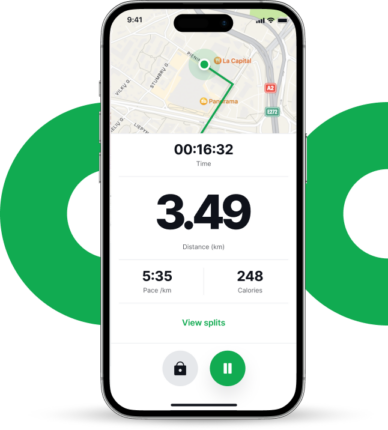Walking is so easy that we often don’t even know we’re doing it. But walking a mile at a fast pace and doing it consistently calls for a bit more awareness. And not just about your walking pace, but about your walking movement and posture.
In this post, we answer, “How long does it take to walk a mile?“, “How long does it take to walk a half mile?” and other related questions. We’ll be converting kilometers to miles and miles to kilometers all the way through to avoid confusion.
Let’s start with a mile chart.
In This Article
In This Article:
Mile Chart: Average Walking Time by Age and Gender
A 2011 study sheds light on the average walking time by age and gender. The study found that men can walk a mile slightly faster than women. But the differences are not that big.
According to the study, women achieve their best walking speed per mile between the ages of 40 and 49. In men, the peak is between ages 30 and 49.
Average walking time for women
| Age | Average mile time | Average speed (miles/hour) | Average speed (km/hour) |
| 20–29 | 20min | 3.0 | 4.83 |
| 30–39 | 20min | 3.0 | 4.83 |
| 40–49 | 19min, 17sec | 3.11 | 5.01 |
| >50 | 28min, 31sec – 20min, 28sec | 2.10 – 2.93 | 3.38 – 4.72 |
Average walking time for men
| Age | Average mile time | Average speed (miles/hour) | Average speed (km/hour) |
| 20–29 | 19min, 43sec | 3.04 | 4.89 |
| 30–39 | 18min, 45sec | 3.2 | 5.14 |
| 40–49 | 18min, 45sec | 3.2 | 5.14 |
| >50 | 27min, 38sec – 18min, 45sec | 2.17 – 3.2 | 3.49 – 5.15 |
Factors Affecting the Walking Time
Many factors can affect the walking time, from your age to the weather. Before you set yourself a walking pace goal, it’s important to consider the factors that may slow you down.
- Age. Walking speed tends to decrease with age. However, a noticeable drop in speed appears only after 50.
- Gender. Men tend to walk faster than women, but the differences are not all that big.
- Incline. Walking on a hill or incline requires more effort and will decrease your mile time. The steeper the incline, the greater the effect on your pace.
- Fitness level. Have you just picked up brisk walking after a sedentary spell? Your mile walking pace will be a few minutes slower than that of an experienced walker or runner.
- Weight. Carrying extra pounds above a normal body mass index can slow you down. The good news is that brisk walking can help with weight loss.
- Shoes. Wearing comfortable running shoes can make walking at a fast pace easier. The right pair of shoes can also help soften the impact of walking on your leg bones and joints.
- Weather. Walking in very hot temperatures or during rainy or snowy weather can slow down your walking pace.
How Long Does It Take to Walk a Mile?
At a moderate intensity, the average walking pace is 2.5–4 miles per hour, according to the HHS Physical Activity Guidelines for Americans report.
So, how long does it take the average person to walk a mile? Most people can walk a mile in 15–22 minutes, according to a 2019 study. At an easy pace, a healthy adult can walk a mile in about 20 minutes, a 2020 systematic review and meta-analysis found.
But competitive walkers can walk a mile much faster. A 2015 study that looked at walking groups found that competitive walkers can walk a mile in 11 minutes.
The world records for the fastest mile ever walked are even more impressive. The world record for the fastest mile ever walked by a man is 5:31.08. It was set in 2017 by British Olympian Tom Bosworth.
Lithuanian Sada Eidikytė set the women’s world record for the fastest mile ever walked back in 1990. It still stands today at 6:16.72.
So, as a recap, how long does it take to walk a mile on average? Broadly speaking, walking a mile takes around…
- 20 minutes at an easy pace
- 15 minutes at a moderate pace
- 11 minutes at a fast pace
What about half a mile? How long does it take to walk half a mile? You can walk half a mile in 6 to 10 minutes, depending on your walking pace.
The bottom line is that if you’re new to brisk walking, walking a mile in 20 or under 20 minutes is a good start. If you’re over 50, aim to finish a mile in under 27–28 minutes.
How Long It Takes to Walk a 5K
Wondering how many kilometers there are in a mile? One mile is roughly 1.6 kilometers. A 5K walking race is 5 kilometers or 3.1 miles. Based on the average mile walking paces above, walking a 5K takes…
- 34 minutes at a fast pace
- 47 minutes at a moderate pace
- 1 hour at an easy pace
As a beginner, finishing a 5K walk in 1 hour or less is a good performance.
How Long It Takes to Walk a 10K
Double the distance of a 5K, a 10K walk is 10 kilometers or 6.2 miles. It can make for a challenging race. Walking a 10K takes…
- 1 hour and 8 minutes at a fast pace
- 1 hour and 32 minutes at a moderate pace
- 2 hours and 4 minutes at an easy pace
Finishing a 10K walk in under 2 hours is a good start for most inexperienced walkers.
How Long It Takes to Walk a Half or Full Marathon
A half-marathon takes the challenge to a new level, making you push through 21.1 kilometers or 13.1 miles. It doesn’t sound easy, and if you walk the whole distance, it can take hours.
Walking a half-marathon takes, on average…
- 2 hours and 24 minutes at a fast pace
- 3 hours and 17 minutes at a moderate pace
- 4 hours and 22 minutes at an easy pace
That’s some serious amount of walking. But it’s still only half as demanding as a full marathon. A marathon is 26.2 miles or 42.2 kilometers. Walking a full marathon can take hours…
- 4 hours and 48 minutes at a fast pace
- 6 hours and 33 minutes at a moderate pace
- 8 hours and 44 minutes at an easy pace
Walking a marathon rather than running it may seem easier, but it’s no mean feat. Even if you plan on walking the whole marathon, it’s still crucial to train for it.
How Much Should You Walk per Day?
How much you walk per day depends on your goals. Do you want to use walking as a way to boost your health? Then follow the CDC recommendation of engaging in 150 minutes of moderate-intensity physical activity every week.
That’s the equivalent of around 20 minutes of moderate-pace walking a day or a walking pace of 2.5–4 miles per hour. Depending on your pace, 20 minutes of walking amounts to 1.25 miles or longer.
Walking 150min a week has a host of health benefits, including:
- Strengthens bones
- Lowers blood pressure, blood sugar, and cholesterol
- Improves mental and emotional well-being
- Wards off depression
- Boosts energy
- Improves memory
- Helps you feel better
- Improves sleep quality
- Reduces the risk of diabetes, heart disease, stroke, dementia, osteoporosis, and some cancers
- Helps you lose weight and prevent weight gain
If you plan to participate in walking races or to use brisk walking to condition your body for running, you may walk more. Ideally, you want to follow a training plan personalized to your fitness level, age, gender, and goals.
Can I Lose Weight by Walking a Mile a Day?
Walking a mile a day can help you burn around 100 calories. While that may not seem like a lot, walking can help with weight loss. Especially if you follow a weight loss diet that makes you take in fewer calories than you burn.
Walking more will help you burn plenty of calories. A 154-pound person can burn 460 calories walking at a vigorous pace of 4.5 miles per hour, according to the CDC. Meanwhile, moderate-pace walking at 3.5 miles per hour can burn 280 calories per hour.
Coupled with a diet low in calories, walking is a friendly moderate-intensity aerobic exercise that can help you control your weight.
How to Increase Your Walking Pace
Aim to increase your walking pace gradually, building speed and stamina in the process. If you’re new to walking, start at an easy pace. If you’ve been running and are in good physical shape, you can start at a moderate pace.
- Start with a weekly goal of walking 10–15 minutes a day at an easy to moderate pace.
- Build gradually to 20–30 minutes of walking a day at a moderate pace for a total of 150 minutes of walking a week.
- Increase your walking mileage by 10% every week.
- Aim for a healthy brisk walking pace of 15 minutes per mile.
Important: You don’t have to walk every day. Walking will put stress on your body, especially your lower body. Allow for a day or two of rest to recover.
Focusing on your walking form can help you up your pace. Follow these key tips:
- Keep your body straight as you walk. Avoid slouching.
- Bend your arms and swing them to boost your momentum.
- Push the ground off with the toes of your back foot.
- Take shorter strides to improve your cadence and take more steps per minute.
Good to know: How many steps in a mile? There are around 2,250 steps in a mile on average. But this depends on your height. Taller people often have a bigger stride and need fewer steps to cover a mile.
Takeaways
By now, you’re probably longing to take a walk. But before you start improving your walking pace, here are the things you need to pay attention to:
- You can walk a mile in 20 minutes at an easy pace to begin with.
- Gradually increase your walking pace to 15 minutes per mile or less.
- Wear a pair of walking or running shoes that provide good cushioning.
- Don’t expect to walk a mile fast overnight: condition your body gradually through brisk walking workouts every week.
- To lose weight walking, pair your walking workout with a low-calorie diet.
Once you start walking, your feet may take you farther than you thought. But wherever you’re headed, make sure to arrive with every step. Mindful awareness of your steps can do wonders for your walking form. And it feels great, too.
Frequently Asked Questions
How long does it take to walk a mile for beginners?
This question is often asked by people who are new to walking or who are trying to get back into shape. The average person can walk a mile in 15-22 minutes, but this can vary depending on your fitness level, age, and the terrain.
How long does it take to walk a mile for a healthy adult?
A healthy adult who is not overweight or out of shape can typically walk a mile in 12-14 minutes. However, this can vary depending on the person’s individual pace and stride length.
How long does it take to walk a mile for a child?
The speed at which a child can walk a mile will depend on their age and development. Children aged 4-5 can typically walk a mile in 20-30 minutes, while children aged 6-8 can typically walk a mile in 15-20 minutes.
How long does it take to walk a mile for a jogger?
A jogger can walk a mile in 8-10 minutes. This is because they are moving at a faster pace than a regular walker.
How long does it take to walk a mile for an athlete?
An athlete can walk a mile in 6-7 minutes. This is because they are very fit and have a lot of training experience.
References:
- Rippe, J.M., Ward, A., Porcari, J.P. and Freedson, P.S., 1988. Walking for health and fitness. Jama, 259(18), pp.2720-2724.
- Yang, Y. and Diez-Roux, A.V., 2012. Walking distance by trip purpose and population subgroups. American journal of preventive medicine, 43(1), pp.11-19.
- Agrawal, A.W. and Schimek, P., 2007. Extent and correlates of walking in the USA. Transportation Research Part D: Transport and Environment, 12(8), pp.548-563.
- Richardson, C.R., Mehari, K.S., McIntyre, L.G., Janney, A.W., Fortlage, L.A., Sen, A., Strecher, V.J. and Piette, J.D., 2007. A randomized trial comparing structured and lifestyle goals in an internet-mediated walking program for people with type 2 diabetes. International Journal of Behavioral Nutrition and Physical Activity, 4, pp.1-11.
- Richardson, C.R., Newton, T.L., Abraham, J.J., Sen, A., Jimbo, M. and Swartz, A.M., 2008. A meta-analysis of pedometer-based walking interventions and weight loss. The Annals of Family Medicine, 6(1), pp.69-77.
- Azmi, D.I., Karim, H.A. and Amin, M.Z.M., 2012. Comparing the walking behaviour between urban and rural residents. Procedia-Social and Behavioral Sciences, 68, pp.406-416.














